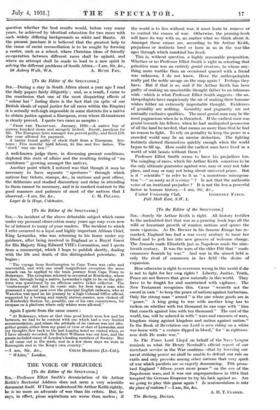[To the Editor of the SPECTATOR.] Sin,—Surely Sir Arthur Keith
is right. All history testifies to the undoubted fact that war as a pruning hook lops all the wild or luxuriant 'growth of wanton nations and spares the more vigorous. As Dr. Brewer in his famous Essays has re- marked, England has had a war every century to tame her blood and to jerk her into new grooves of welcome change. The Armada made Elizabeth just as Napoleon made the nine- teenth century. It was the wars of the elder Pitt that" made commerce flourish by war." And war in the armed field is only the rival of commerce in her field—the desire of expansion.
How otherwise is right to overcome wrong in this world if she is not to fight for her own rights Liberty, Justice, Truth, Peace arc not flowers that grow naturally in this world. They have to be fought for and maintained with vigilance. The New Testament recognizes this. Ctesar " weareth not the sword in vain" to keep the peace of nations against barbarians. Only the strong man " armed " is the one whose goods are in "peace." A king going to war with another king has to reckon on whether with ten thousand he can cope with "him that cometh against him with ten thousand." The end of the world, too, will be ushered in with" wars and rumours of wars, kingdom rising against kingdom and nation against nation." In the Book of Revelation our Lord is seen riding on a white war-horse with "a vesture dipped in blood," for "in righteous- ness doth He make war."
In The Times Lord Lloyd on behalf of the Navy League reminds us what Sir Henry Newbolt's official report of our merchant service in the War confirms—that by lowering our naval striking power we shall be unable to defend our rule on earth and only provoke among other nations that very spirit of war which pacifists are so eagerly denouncing. Pitt prom- ised England "fifteen years more peace" on the eve of the Napoleonic wars, and it was our unpreparedness in 1914 that tempted the German Emperor to try his luck against us. Are we going to play this game again ? Is sentimentalism to take the place of realism ? —I am, Sir, are.
The Rectory, Devizes. A. H. T. CLARKE.










































 Previous page
Previous page